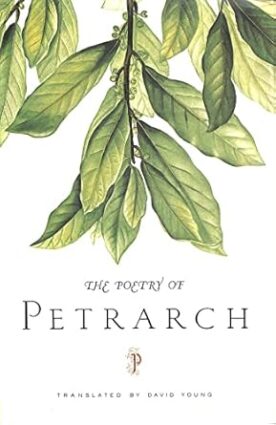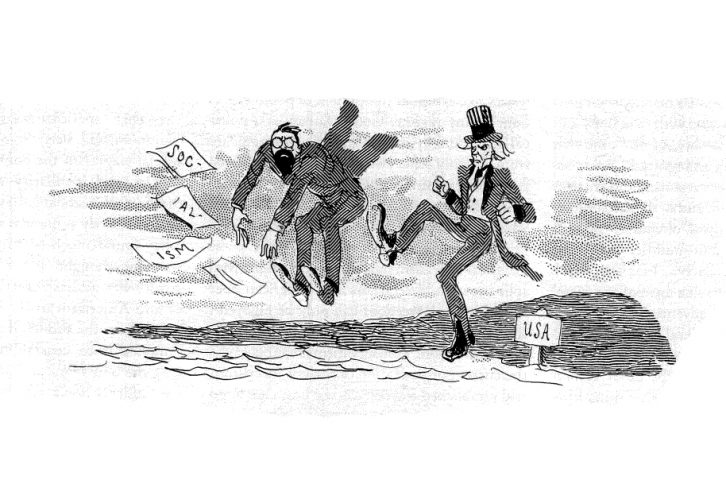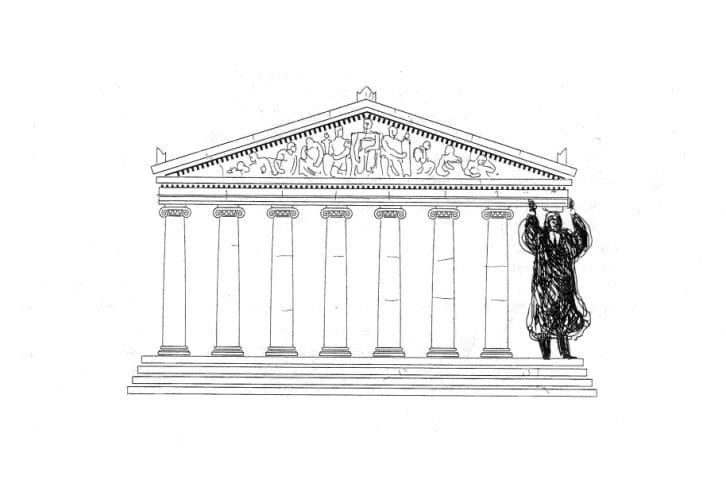Books Reviewed
It must have been frustrating, the job of Chief of Italian Poetry in the decades after the death of Dante. The more so if, like Francis Petrarch (1304-1374), you were a man of immense ambition, broad learning, experience in the turbid and treacherous politics of your day, and genius enough to understand the all-inclusive intricacy of Dante’s Comedy—but not genius enough to match it.
The great poet casts his shadow over Petrarch’s entire career, and Petrarch himself was canny enough to use it to his own advantage by writing at crosscurrents to Dante. If Dante fell enamored of a mysterious young lady named Beatrice, “the blessed one,” and wove that young love into poems exploring the relationship between human desire and that “Love that moves the sun and the other stars,” then Petrarch in turn fell enamored of a mysterious young lady, Laura, suggesting the laurel wreath that garlands the brow of the poet Petrarch longed to become. If Dante’s La Vita Nuova—literally, “The New Life,” or “The Strange New Life”—dramatizes first the youthful narrator’s error or wandering, and later, after the death of Beatrice, his suddenly awakened insight into the true nature of the Lord whose name is Love, then Petrarch must organize his Rime Sparse—literally “Scattered Rhymes,” as of seed, or frivolous things to toss aside—from the point of view of an old man who knows what his great mistake was, but who lacks the will, on his own, to retrace his steps. Dante’s Comedy is structured by the eternal harmonies of God Himself and the cosmos He has created. Petrarch’s 366 Rime are structured rather by the fleet passage of time, covering a year and a day, yet ever beneath the judgment of that eternity from which time derives its being and meaning.
If Petrarch sounds like the medieval poet he was, rather than the weepy love poet later generations took him for, that is right and just. Renaissance sonneteers like Sir Philip Sidney and Edmund Spenser, 200 years later, may well have made sport of some of the sillier Petrarchan motifs (like burning in ice and freezing in fire), but they understood all along that the old Florentine was never to be identified simply with his poetic narrator. They saw, too, that the Rime was not a collection of poems but a unified work, a single poem that one could not interpret outside of the Christian context. This is why the cornerstone poem in Sidney’s Astrophil and Stella, the Seventh Song, celebrates the glory of a wise foolishness, for the wisdom of the world is foolishness to God. It is also why, in his Amoretti, Spenser continues his central block of poems to correspond with the 47 days of Lent and Holy Week, ending with an Easter poem of calm and impressive power: “Most glorious Lord of life, that on this day / Didst make thy triumph over death and sin” (68.1-2). They must have noted, though it remains a tantalizing mystery why none of the poets after Dante ever bothered to explain these things explicitly, that Petrarch’s 263 poems in vita di Laura (that is, during Laura’s life) correspond to 263 days beginning with April 6, the traditional date of the original Good Friday, with day 264 (the first poem in morte di Laura) landing on December 25, Christmas Day. Not to put too fine a point on it, the poetry of Laura is born on the day Christ dies, and it becomes a poetry of Laura’s death on the day Christ is born.
What we are to make of these theological and amatory fabrics is one thing; but that we are to make something of them is certain. In short, you cannot interpret or translate Petrarch as if he were merely a modern man who had managed to shake free of the bulky, many-dimensional chrysalis of the medieval cosmos to flit along in our subjectivist world of three dimensions, me, myself, and I. You have to have an ear for theology and Scripture, not to mention Dante, and when you are translating you have to ensure that the echoes are heard. The task as I see it is not to make Petrarch familiar to us, but to familiarize us with him: to encourage us to look upon his work with wonder, inasmuch as it is rich and strange.
* * *
That is not the task that David Young sets for himself in his translation. Granted, the consensus among translators these days is turning noticeably conservative, so that Young himself wishes “to stay close to Petrarch’s diction, syntax, and tone, not wishing to impose my own sensibility or vocabulary on what was so well thought out and so remarkably consistent in the first place.” And in large part Young is the faithful translator he wants to be. He also lends Petrarch’s poetry a good deal of the freshness, perhaps even the breeziness, of our modern idiom, which is also his aim, and an entirely defensible one. Translators should not sound like Harriet Beecher Stowe. Thus if you read Young’s translation you will never be presented with things that Petrarch did not say, or brazen attempts to distort what he said. You will always be reading poems that make syntactical and intellectual sense, and that, all in all, move pretty swiftly and are pleasurable to read. Those are considerable merits. But you will not be getting Petrarch’s heart.
For when it comes to Christianity, Young is simply tone-deaf. His introduction asserts the facile, false dichotomy between earthly love and heavenly love; between earthly beauty and heavenly beauty. How can anyone with a passing knowledge of Scripture, of medieval art, of Thomas Aquinas, or of Augustine’s famous distinction between caritas and cupiditas, write the following?
Cupid might be thought of as the personified equivalent of some of our modern ideas about biological imperatives and sex drives. He undermines self-control, and he blinds us to larger realities by dominating our senses. A pagan presence in a Christian poem, he is a powerful contradiction to the way that the Church says the world is supposed to work.
Cupid had been plying his bow and arrow for centuries in Christian poetry, without necessarily becoming a “pagan presence” —unless cupidity is peculiarly pagan. On the contrary, “the Church” (and what the Church has to do institutionally with this matter, I have no idea) had long said that cupidity was just the thing that made the world go round: the world of sin, that is, the City of Man, characterized by its cupiditas, its lust for domination and possession. Nor is cupidity defined by its object: I can be in the grip of “Cupid” due either to my lust for glory or for gain; and I can love charitably by looking with eyes of heavenly as well as perfectly earthly desire upon the beauty of the woman I am to marry. Spenser, whose riff on Petrarch ends in the joy of a wedding day (and wedding night), thus happily names his sonnet sequence Amoretti, after a multitude of little Cupids. I spend some time on the matter of theology because it shows where Young succeeds and where he falls short. Let us look at one of Young’s favorites, sonnet 189:
Passa la nave mia colma d’oblio
per aspro mare a mezza notte il verno
enfra Scilla e Caribdi, et al governo
siede ‘l signore anzi ‘l nemico mio;
a ciascun remo un pensier pronto et rio
che la tempesta e ‘l fin par ch’ abbi a scherno;
la vela rompe un vento umido eterno
di sospir, di speranze et di disio;
pioggia di lagrimar, nebbia di sdegni
bagna et rallenta le gia stanche sarte
che son d’error con ignoranzia attorto.
Celansi i duo mei dolci usati segni,
morta fra l’onde e la ragion et l’arte
tal ch’i’ ‘ncomincio a desperar del porto.
My galley, loaded with forgetfulness,
rolls through rough seas, at midnight, during winter,
aiming between Charybdis and sharp Scylla;
my lord, ah no, my foe, sits at the
tiller;
each oar is wielded by a quick, mad thought
that seems to scorn the storm and what it means;
an endless wind of moisture, of deep sighs,
of hopes and passions, rips the sail in half;
tears in a steady downpour, mists of hate,
are loosening and soaking all the ropes,
ropes made of ignorance, tangled up with error.
The two sweet stars I steer by are obscured;
reason and skill are dead amid the waves;
and I don’t think I’ll ever see the port.
Some of the lines pack a nice punch. I especially like “the two sweet stars I steer by” and the quick violence of “rips the sail in half.” What’s missing? Let us look at the version by Mark Musa (1996):
My ship full of forgetful cargo sails
through rough seas at the midnight of a winter
between Charybdis and the Scylla reef,
my master, no, my foe, is at the helm;
at each oar sits a quick and insane thought
that seems to scorn the storm and what it brings;
the sail, by wet eternal winds of sighs,
of hopes and of desires blowing, breaks;
a rain of tears, a mist of my disdain
washes and frees those all too weary ropes
made up of wrong entwined with ignorance.
Hidden are those two trusty signs of mine;
dead in the waves is reason as is skill,
and I despair of ever reaching port.
The crucial word in the poem is desperar, to lose hope, to despair. It is ineluctably theological. No reader in Petrarch’s day could have missed its implication of eternal loss. It is not simply that the speaker of the poem is losing hope that his love for Laura will ever be requited; it is that he is losing hope of ever knowing the true way of Love at all. Hence the language of the poem suggests that a soul conscious of its sin has made of itself a ship that is not seaworthy: its very ropes are “made up of wrong”; the “eternal winds of sighs” echo the tempest-blown wailing of the lustful in Inferno 5; the despair at the end echoes the despair of Dante’s persona at the beginning of the Inferno, when he is so faced down by the beasts that he “lost all hope to gain the mountaintop.” Thomas Bergin’s old-fashioned translation renders the last line with theological and dramatic, if not literal, accuracy: “‘What hope of harbor now?’ I cry in terror.” The fin of the tempest—”what it brings,” says Musa with a muted hint of eternal loss; “what it means,” says Young with no hint of that at all; “the end,” says Robert Durling (prose translation, 1976)—is either death or the purpose for which tempests have been raised. A dangerous thing, indeed, to scorn both. Young does not catch the hint.
* * *
The failure to register Christianity is like removing the bass line from a Bach fugue; whole poems seem thinner and flatter for it. Take, for instance, the poem describing Petrarch’s first sight of Laura, sonnet 3:
Era il giorno ch’ al sol si scoloraro
per la pieta del suo fattore i rai
quando i’ fui preso, et non me ne guardai,
che i be’ vostr’ occhi, Donna, mi legaro.
Tempo non mi parea di far riparo
contr’ a’ colpi d’Amor; pero m’andai
secur, senza sospetto, onde i miei guai
nel commune dolor s’incominciaro.
Trovommi Amor del tutto disarmato,
et aperta la via per gli occhi al core
che di lagrime son fatti uscio et varco.
Pero al mio parer non li fu onore
ferir me de saetta in quello stato,
a voi armata non mostrar pur l’arco.
It was the day the sun himself grew pale
with grieving for his Maker—I was seized
and made no effort to defend myself;
your lovely eyes had held and bound me, Lady.
It didn’t seem a time to be on guard
against Love’s blows, so I went confident
and fearless on my way. My troubles started
amid the universal sense of woe.
Love found me wholly undefended, with
the way from eyes to heart completely open,
eyes that are now the conduit for tears.
He got no glory by it; I was helpless.
And he let you escape with no attack
when you were well defended, fully armed.
As poetry it’s not at all bad. I like the clipped, terse comment of line 12, and the sonorous and ominous final phrase, “fully armed.” But “the universal sense of woe”? That is simply not what Petrarch wants the reader to be thinking about. It is not a “sense” of woe, but woe itself, and it is something other than universal. It is “common,” that is, shared acutely by every man and woman who ever lived. Woe is our common lot, because sin is our common state. The speaker simply refuses to understand it. He says, “It wasn’t fair, Love, that you attacked me on Good Friday, because I was distracted, not paying attention to you,” when in fact the very meaning of Good Friday ought to have armed him. He was not, as Young says, “helpless.” Musa is more accurate in rendering Petrarch’s shading away from the point of view of the speaker: his line 12 repeats the key word “seems” from line 5: “It seems to me it did him little honor.”
The reader may notice strong similarities among the translations. Consider the opening stanza of poem 22, a lovely sestina and the first poem in Petrarch’s sequence that departs from the sonnet form. I will give three English versions:
For any animal that lives on earth,
except for those few made to hate the sun,
the time for toil is while it still is day;
but then when heaven lights up all its stars
some go back home while some nest in the wood
to find their rest at least until the dawn.
For any animal who dwells on earth,
(except those few who hate to be in sun),
the time for labor is throughout the day;
but then when Heaven kindles all its stars
some go back home, some nest within the forest
and take their rest at least until the dawn.
To any animal that dwells on earth,
Except for but a few that hate the sun,
Is given time to toil till close of day;
But as soon as the sky lights up the stars
Some return home and some hide in the wood
To find a rest at least until the dawn.
Now, since a sestina’s lines must end in key words repeated from stanza to stanza, it is not entirely surprising that these versions should be so similar. Yet it is also hard, then, to make a case for a new version. The first is Musa’s, the second Young’s, the third, by Anna Maria Ascoli (1946). They are all fine translations. I could quibble here and there: all three miss the allusion to Francesca’s speech in Inferno 5, where animal clearly means “living soul”—thus Petrarch is not speaking merely about what we call animals, but about the nature of living things generally to seek the light. Young and Ascoli are nearer the mark with “dwells” than is Musa with “lives,” and yet Young chooses ill in departing from Ascoli and Musa in translating the Italian selva as “forest.” The word must retain its associations with subhumanity, wilderness, savagery—what Dante was thinking when he used it at the beginning of the Inferno. For we are here entering Petrarch’s dark wood, his terrible wilderness.
It is hard to catch the shadows of that wilderness, for Petrarch’s is an elusive voice, at once plaintive and self-mocking, brooding and whimsical, misty and theologically acute. I think he is more difficult to translate than Dante, not because his poetry possesses greater intricacy (no one is more of a Gothic architect than Dante), but because of his habit of requiring the reader to distinguish between shadow and shadow. No one that I have read has translated him poorly—far from it. But neither has anyone quite caught the flickers of intense light and the deep tremolos of darkness that suddenly interrupt them. But then to quote Petrarch himself, our life is short, and our native powers unfit for so high an enterprise. Young’s translation pleases, but remains within the fold.






